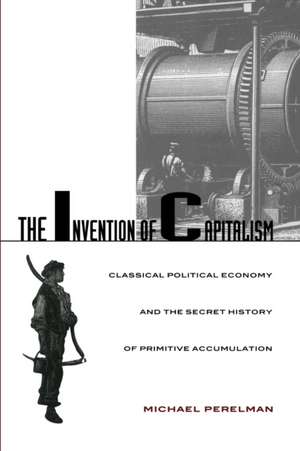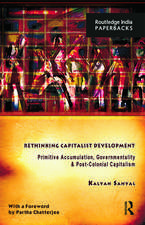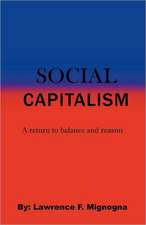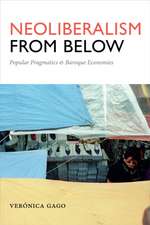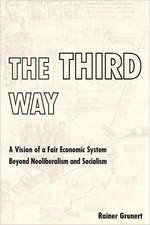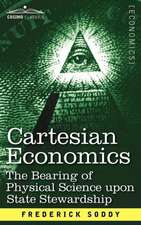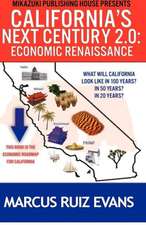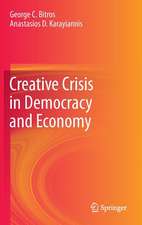The Invention of Capitalism – Classical Political Economy and the Secret History of Primitive Accumulation
Autor Michael Perelmanen Limba Engleză Paperback – 2 mai 2000
Preț: 218.05 lei
Nou
Puncte Express: 327
Preț estimativ în valută:
41.73€ • 43.51$ • 34.68£
41.73€ • 43.51$ • 34.68£
Carte disponibilă
Livrare economică 27 februarie-13 martie
Livrare express 13-19 februarie pentru 35.92 lei
Preluare comenzi: 021 569.72.76
Specificații
ISBN-13: 9780822324911
ISBN-10: 0822324911
Pagini: 424
Dimensiuni: 157 x 235 x 26 mm
Greutate: 0.59 kg
Editura: MD – Duke University Press
ISBN-10: 0822324911
Pagini: 424
Dimensiuni: 157 x 235 x 26 mm
Greutate: 0.59 kg
Editura: MD – Duke University Press
Recenzii
"[A] clearly written, vigorously argued book . . . ."
--Jay Carlander," Labor History"
"[A] lively polemic directed at the Classical political economists. . . ."
--Gregory Clark, EH.NET
"An eye-opening book which should be required reading for every economist." (Five of five stars)
--Business Ethics
"This volume raises a number of pertinent questions regarding the important matter of how property rights are redistributed in the course of economic development and calls attention to a number of interesting but neglected writers."
--D. Mitch, "Choice"
"Perelman's study of the ideological support for primitive accumulation raises a set of significant issues at the conjunction of liberal political thought and classical political economy that deserve further investigation."
--Vikash Yadav, "Theory and Event"
"[P]rovocative . . . . [A] welcome stimulus to debate among researchers in the history of economic thought, and may also be a valuable reference for advanced political economy and history of economic thought courses."
--Bruce Philp, "History of Economics Review"
"Perelman has done a remarkable job examining and synthesizing the work of Smith Steuart, Wakefield, and Ricardo, among others, with an eye toward their views on primitive accumulation. . . . [T]he breadth and novelty of Perelman's claims make The Invention of Capitalism a book to be read, discussed, and debated."
--John S. Nader," Review of Radical Political Economics"
"This study is to be admired for its comprehensiveness, scope, and the amount of unearthing and excavation Perelman provides. The indictment of political economists who addressed themselves to the matter of primitive accumulation is masterful."--H. T. Wilson, York University
--Jay Carlander," Labor History"
"[A] lively polemic directed at the Classical political economists. . . ."
--Gregory Clark, EH.NET
"An eye-opening book which should be required reading for every economist." (Five of five stars)
--Business Ethics
"This volume raises a number of pertinent questions regarding the important matter of how property rights are redistributed in the course of economic development and calls attention to a number of interesting but neglected writers."
--D. Mitch, "Choice"
"Perelman's study of the ideological support for primitive accumulation raises a set of significant issues at the conjunction of liberal political thought and classical political economy that deserve further investigation."
--Vikash Yadav, "Theory and Event"
"[P]rovocative . . . . [A] welcome stimulus to debate among researchers in the history of economic thought, and may also be a valuable reference for advanced political economy and history of economic thought courses."
--Bruce Philp, "History of Economics Review"
"Perelman has done a remarkable job examining and synthesizing the work of Smith Steuart, Wakefield, and Ricardo, among others, with an eye toward their views on primitive accumulation. . . . [T]he breadth and novelty of Perelman's claims make The Invention of Capitalism a book to be read, discussed, and debated."
--John S. Nader," Review of Radical Political Economics"
"This study is to be admired for its comprehensiveness, scope, and the amount of unearthing and excavation Perelman provides. The indictment of political economists who addressed themselves to the matter of primitive accumulation is masterful."--H. T. Wilson, York University
Descriere
The originators of classical political economy--Adam Smith, David Ricardo, James Steuart, and others--created a discourse that explained the logic, the origin, and, in many respects, the essential rightness of capitalism. But, in the great texts of that discourse, these writers downplayed a crucial requirement for capitalism's creation: For it to succeed, peasants would have to abandon their self-sufficient lifestyle and go to work for wages in a factory. Why would they willingly do this?
Clearly, they did not go willingly. As Michael Perelman shows, they were forced into the factories with the active support of the same economists who were making theoretical claims for capitalism as a self-correcting mechanism that thrived without needing government intervention. Directly contradicting the laissez-faire principles they claimed to espouse, these men advocated government policies that deprived the peasantry of the means for self-provision in order to coerce these small farmers into wage labor. To show how Adam Smith and the other classical economists appear to have deliberately obscured the nature of the control of labor and how policies attacking the economic independence of the rural peasantry were essentially conceived to foster primitive accumulation, Perelman examines diaries, letters, and the more practical writings of the classical economists. He argues that these private and practical writings reveal the real intentions and goals of classical political economy--to separate a rural peasantry from their access to land.
This rereading of the history of classical political economy sheds important light on the rise of capitalism to its present state of world dominance. Historians of political economy and Marxist thought will find that this book broadens their understanding of how capitalism took hold in the industrial age.
Clearly, they did not go willingly. As Michael Perelman shows, they were forced into the factories with the active support of the same economists who were making theoretical claims for capitalism as a self-correcting mechanism that thrived without needing government intervention. Directly contradicting the laissez-faire principles they claimed to espouse, these men advocated government policies that deprived the peasantry of the means for self-provision in order to coerce these small farmers into wage labor. To show how Adam Smith and the other classical economists appear to have deliberately obscured the nature of the control of labor and how policies attacking the economic independence of the rural peasantry were essentially conceived to foster primitive accumulation, Perelman examines diaries, letters, and the more practical writings of the classical economists. He argues that these private and practical writings reveal the real intentions and goals of classical political economy--to separate a rural peasantry from their access to land.
This rereading of the history of classical political economy sheds important light on the rise of capitalism to its present state of world dominance. Historians of political economy and Marxist thought will find that this book broadens their understanding of how capitalism took hold in the industrial age.
Textul de pe ultima copertă
"After reading Michael Perelman's excellent book we see our world in different colors. The origin of market capitalism is the product of strategies pursued to take away from people the conditions for developing alternative ways to live and produce. We also discover that classical political economy has been so instrumental in guiding these strategies. The book leaves us to wonder how the same mechanisms are reproduced today. This critical question pervades the book."--Massimo De Angelis, University of East London
Notă biografică
Michael Perelman is Professor of Economics at California State University, Chico. His books include "The Natural Instability of Markets: Expectations, Increasing Returns, and the Collapse of Markets."
